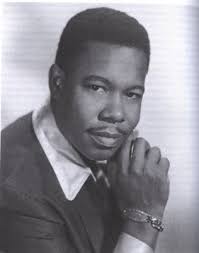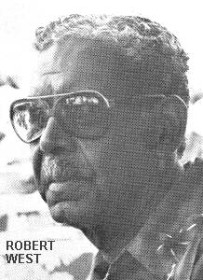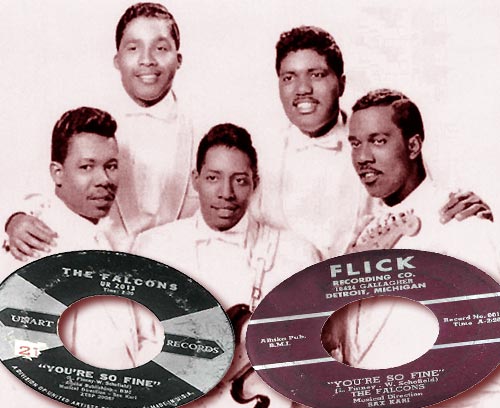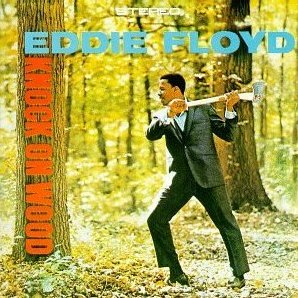Eddie Floyd was born in Montgomery, Alabama in 1937. After his father left the family to work in the steel mills in Detroit, Eddie, his mother, and his younger brother lived with his grandparents in Montgomery. Two of his early music influences, Hank Williams, and Nat “King” Cole were from his hometown, and he listened to their music growing up.
Eddie also spent a great deal of time in Detroit during his early years. His uncle, Robert West, had been part of the Great Migration of blacks to northern industrial cities in search of better wages and living conditions. West started a very successful real estate business that helped blacks find homes in Detroit where invisible, racist “red lines’ marked where black people could buy a house.  Eddie Floyd
Eddie Floyd
West and his wife didn’t have children of their own, and Eddie’s mother would bring the kids by train and stay with them for long periods of time while she found work as a nurse. Robert West was a big jazz fan, and Eddie was exposed to his uncle’s large record collection on his visits to the Motor City. His mother also took him to shows at the Fox, a major black theater at the time, where he saw Lena Horne, Count Basie, Ella Fitzgerald, Billy Eckstine and many others.
When his mother decided to stay in Montgomery full time when Eddie turned 13, he rebelled, got into big trouble, and was sentenced to three years in a juvenile facility. It was tough, but he was lucky that one of the teachers took an interest in him and helped develop his love of music and singing.
After his release at the age of 16, Eddie was taken to Detroit to live with his uncle in their home located just west of Hastings Street and the Black Bottom neighborhood. Influenced by popular Detroit groups like The Midnighters and Nolan Strong and The Diablos, Eddie and his friend Arnett Robinson formed a singing group with two white boys, Bob Manardo and Tom Shetler. A mixed race group was highly unusual for the time, but Robert West was enthused about the group and Detroit’s music scene and sold his real estate office and opened a recording business.
The popularity of “bird groups” like The Orioles, The Ravens, The Crows, and The Penguins led to naming themselves The Falcons in 1955 after adding bass singer Willie Schofield. The group scene was exploding all over the country but, according to Eddie Floyd, it was Frankie Lymon and The Teenagers that broke open the floodgates with “Why Do Fools Fall in Love” in early 1956. “It was the record everything had been leading up to,” he wrote in his autobiography. “In many ways, that was the start of it all.” 
Robert West backed the young group completely, bringing in a vocal coach to work on their harmonies, buying them suits to perform in, booking them in area supper clubs, and helping them get signed to Mercury Records. After one unsuccessful single, The Falcons were dropped by Mercury and the group changed dramatically when both Manado and Schetler joined the military.
Needing replacements, West recruited Joe Stubbs and guitarist Lance Finnie from a Detroit group called The Fabulous Four. The final piece was the addition of Bonnie “Mack” Rice, an experienced singer and budding songwriter. West brought this new lineup into The United Sound studio in Detroit to record a single for his tiny Silhouette label.
Nothing much happened with the group’s recordings until West set them up with producer Sax Kari for a session for Flick, another label he’d set up. The recording of “You’re So Fine” was done in a small basement studio owned by disc jockey Bristoe Bryant that was located underneath a record store called Music City. The group, which featured Joe Stubbs on lead, recorded their vocal in the bathroom because of the echo at 3:00 a.m. in the morning. The resulting record was raw but it contained a certain magic, and Berry Gordy Jr. who was at the session declared that it was going to be a “smash.”
Shortly thereafter, Gordy launched his Tamla label with Marv Johnson’s “Come To Me.” After the singles began getting a lot of airplay in Detroit, major label United Artists licensed both songs and re-released them on its Unart subsidiary. The label then sent Johnson and The Falcons on a promotional tour around the country playing record hops, visiting radio stations, and watching their single climb the charts.  The Falcons
The Falcons
“Come To Me” became a Top Ten R&B hit, but “You’re So Fine” charted higher – reaching # 2 and only kept off the top spot by Lloyd Price’s “Personality” and The Drifters’ “There Goes My Baby.” The Falcons’ hit also reached # 17 on Billboard’s Hot 100 in 1959, and it enabled them to become the first Detroit vocal group to appear on American Bandstand.
Although The Falcons were now appearing on some of the nation’s biggest stages, their recordings were now under the control of United Artists. Sessions were held in New York under the direction of Don Costa and his orchestra and featuring female backing singles. The elements that had made “You’re So Fine” special were missing from their subsequent recordings and they disappeared from the charts.
When Joe Stubbs left the group to pursue a solo career, he was replaced by a gospel singer name Wilson Pickett. He had achieved success in a Detroit gospel group called The Violinaires, and he brought his distinctive vocals and strong personality to The Falcons.
This was most apparent in a song he wrote called “I Found A Love.” Recorded while the group was on tour at the King Records studio in Cincinnati with backing by the Ohio Untouchables, it is considered to be one of the early examples of what became known as soul music.
“I Found A Love” was first released on Lu Pine, yet another of Robert West’s labels, but it is soon licensed to Atlantic Records and becomes The Falcons’ second national hit. After completing a major tour with James Brown, Pickett left the group for a solo career. Shortly thereafter, Willie Schofield was drafted and the group broke up.
Following several unsuccessful solo releases, Floyd signed a contract with the Memphis-based Stax Records as a songwriter in 1965, and he wrote a hit song, "Comfort Me", recorded by Carla Thomas. He then teamed with Stax's guitarist Steve Cropper to write songs for Wilson Pickett, now signed to Atlantic Records. Atlantic distributed Stax, and Jerry Wexler brought Pickett from New York City to work with Booker T. & the MGs. The Pickett sessions were successful, yielding several pop and R&B hits, including the Floyd co-written "Ninety-Nine and a Half (Won't Do)" and "634-5789 (Soulsville U.S.A.)”.  "Knock On Wood"
"Knock On Wood"
In 1966, Floyd recorded a song initially written for Otis Redding. Wexler convinced Stax president Jim Stewart to release Floyd's version. The Steve Cropper-Eddie Floyd “Knock on Wood” launched Floyd's solo career, and has been covered by over a hundred different artists from David Bowie to Count Basie. Eventually, Redding would cut an R&B hit version of the song in 1967 as a duet with Carla Thomas. It became a # 1 disco hit for Amii Stewart in 1979.
Floyd was one of Stax's most consistent and versatile artists. He scored several more hits on his own, including "I've Never Found a Girl (To Love Me Like You Do)" and “Raise Your Hand”, which was covered by both Janis Joplin and Bruce Springsteen.
His song "Big Bird" (featuring Booker T. Jones on organ and guitar, Al Jackson Jr. on drums, and Donald “Duck” Dunn on bass) was written while Floyd waited in a London airport for a plane back to the United States for Otis Redding's funeral. Floyd's solo career did not keep him from being one of the label's most productive writers. Almost every Stax artist recorded Floyd material, often co-written with either Cropper or Jones.
In 1980, Floyd released material on the UK record label I-Spy Records, owned and created by the UK band Secret Affair. He also joined old Stax collaborators Cropper and Dunn, and fronted the Blues Brothers Band on a series of world tours, and in 1998, Floyd and former Falcon Wilson Pickett appeared on screen performing "634-5789" in Blues Brothers 2000. As well as singing with The Blues Brothers Band, Floyd was also the special guest with former Rolling Stone Bill Wyman’s Rhythm Kings on several dates in the US and the UK.
In 2008, Floyd returned to Stax Records, which was owned by Concord Music Group since 2004. His first new album in six years, "Eddie Loves You So", was released in July 2008. In November 2012, Floyd was inducted into the Carolina Beach Music Hall of Fame as a Pioneer Award Recipient. In 2016 he was inducted into the national Rhythm & Blues Hall of Fame. In addition, Eddie Floyd was named to the Memphis Music Hall of Fame in 2018 and the Michigan Rock and Roll Legends Hall of Fame in 2024.
Sources:
Knock! Knock! Knock! On Wood by Eddie Floyd with Tony Fletcher
Wikipedia: Eddie Floyd

